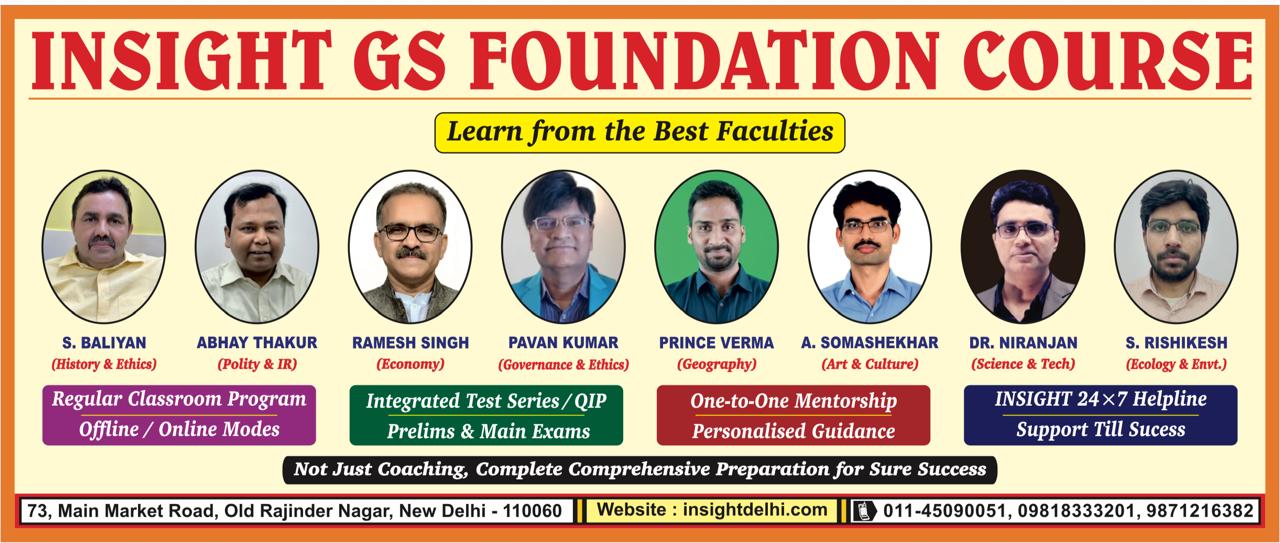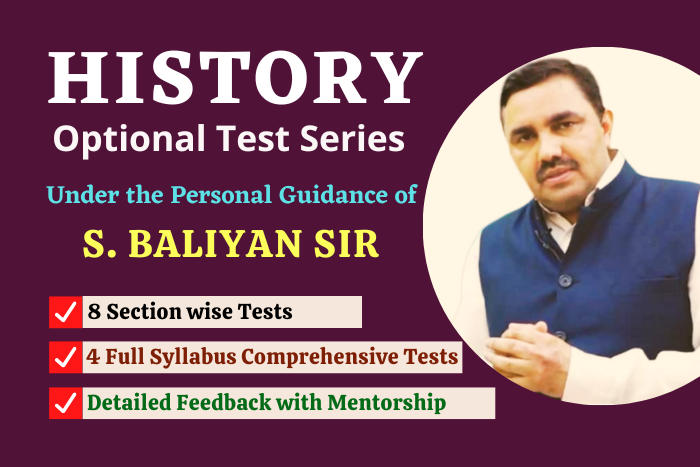- This programme has been designed by S. Baliyan Sir for those students who have completed their preparation for Mains Examination and now want to give finishing touch to their preparation.
- The aim of this programme is to improve the Writing Skills of the students and to help them in writing Quality Enriched answers within the stipulated time limit.
- To achieve this objective, 12 Self-Assessment Tests (SAT) will be conducted. All the test papers will be strictly in accordance with UPSC Main Examination. The level of the questions will also be similar to that of Main Examination. This exercise will equip the students with necessary expertise to write very good answers in the examination hall and score 300 – 330 marks out of 500 easily.
- The SATs have been designed topic wise. The complete syllabus has been divided into 8 parts. These 12 tests include 8 Topic-wise Tests and 4 Comprehensive Tests covering the full syllabus.
- Answers and different dimensions of each and every question will be discussed in detail and discussion video will be provided for every test. This will help students not only in improving the answer of questions asked in the test but also in writing high quality answers for similar other questions.
- Model Answer Formats (MAF) will be provided along with checked copies to aspirants.
- Special tips for scoring high-grade marks will also be shared with students during the discussions.
- Copies of students will be checked by S. Baliyan sir himself with remarks on answers written by students.
- FREE Map Classes will also be provided along with Map Study Material.
SYLLABUS
Enlightenment and Modern ideas :
(a) Major ideas of Enlightenment; Kant, Rousseau.
(b) Spread of Enlightenment in the colonies
(c) Rise of socialist ideas (up to Marx); spread of Marxian Socialism.
Origins of Modern Politics :
(a) European States System
(b) American Revolution and the Constitution
(c) French revolution and aftermath, 1789 – 1815
(d) American Civil War with reference to Abraham Lincoln and the abolition of slavery
(e) British Democratic politics (1815 – 1850) –Parliamentary Reformers, Free Traders, Chartists
Industrialization :
(a) English Industrial Revolution; causes and impact on Society
(b) Industrialization in other countries; USA, Germany, Russia, Japan
(c) Industrialization and Globalization
Nation – State System :
(a) Rise of Nationalism in the 19th century
(b) Nationalism; state-building in Germany and Italy
(c) The disintegration of Empires in the face of the emergence of nationalities across the world
Revolution and Counter-Revolution :
(a) 19th Century European revolutions
(b) The Russian Revolution of 1917 – 1921
(c) Fascist Counter-Revolution, Italy and Germany.
(d) The Chinese Revolution of 1949
World Wars :
(a) 1st and 2nd World Wars as Total Wars: Societal implications
(b) World War I: Causes and consequences
(c) World War II: Causes and consequences
SYLLABUS
The World after World War II :
(a) Emergence of two power blocs
(b) Emergence of Third World and non – alignment
(c) UNO and the global disputes
Imperialism and Colonialism :
(a) South and South – east Asia
(b) Latin America and South Africa
(a) Australia
(b) Imperialism and free trade; Rise of neo – imperialism.
Liberation from Colonial Rule :
(a) Latin America – Bolivar
(b) Arab world – Egypt
(c) Africa – Apartheid to Democracy
(d) South – East Asia – Vietnam
(e) Decolonization and Underdevelopment
(f) Factors constraining development: Latin America, Africa
Unification of Europe :
(a) Post War Foundations : NATO and European Community
(b) Consolidation and Expansion of European Community
(c) European Union
Disintegration of Soviet Union and the Rise of the Unipolar World
(a) Factors leading to the collapse of Soviet communism and the Soviet Union, 1985– 1991
(b) Political Changes in Eastern Europe 1989– 2001
(c) End of the cold war and US ascendancy in the world as the lone superpower.
May 15,2024
Enlightenment and Modern ideas :
(a) Major ideas of Enlightenment; Kant, Rousseau.
(b) Spread of Enlightenment in the colonies
(c) Rise of socialist ideas (up to Marx); spread of Marxian Socialism.
Origins of Modern Politics :
(a) European States System
(b) American Revolution and the Constitution
(c) French revolution and aftermath, 1789 – 1815
(d) American Civil War with reference to Abraham Lincoln and the abolition of slavery
(e) British Democratic politics (1815 – 1850) –Parliamentary Reformers, Free Traders, Chartists
Industrialization :
(a) English Industrial Revolution; causes and impact on Society
(b) Industrialization in other countries; USA, Germany, Russia, Japan
(c) Industrialization and Globalization
Nation – State System :
(a) Rise of Nationalism in the 19th century
(b) Nationalism; state-building in Germany and Italy
(c) The disintegration of Empires in the face of the emergence of nationalities across the world
Revolution and Counter-Revolution :
(a) 19th Century European revolutions
(b) The Russian Revolution of 1917 – 1921
(c) Fascist Counter-Revolution, Italy and Germany.
(d) The Chinese Revolution of 1949
World Wars :
(a) 1st and 2nd World Wars as Total Wars: Societal implications
(b) World War I: Causes and consequences
(c) World War II: Causes and consequences
May 16,2024
The World after World War II :
(a) Emergence of two power blocs
(b) Emergence of Third World and non – alignment
(c) UNO and the global disputes
Imperialism and Colonialism :
(a) South and South – east Asia
(b) Latin America and South Africa
(a) Australia
(b) Imperialism and free trade; Rise of neo – imperialism.
Liberation from Colonial Rule :
(a) Latin America – Bolivar
(b) Arab world – Egypt
(c) Africa – Apartheid to Democracy
(d) South – East Asia – Vietnam
(e) Decolonization and Underdevelopment
(f) Factors constraining development: Latin America, Africa
Unification of Europe :
(a) Post War Foundations : NATO and European Community
(b) Consolidation and Expansion of European Community
(c) European Union
Disintegration of Soviet Union and the Rise of the Unipolar World
(a) Factors leading to the collapse of Soviet communism and the Soviet Union, 1985– 1991
(b) Political Changes in Eastern Europe 1989– 2001
(c) End of the cold war and US ascendancy in the world as the lone superpower.
Terms & Conditions
1. Details of a Student: Every student subscribing any courseof has to fill/uploadthe required details on his/her 'Profile' page such as passport size photo, ID Proof, Address proof, etc. in compliance with the KYC (Know your Customer) requirements mandated by the management of institute and the regulatory authorities.
2. Cyber-crime as per IT Act: Sharing your access, recording, downloading or trying to sellor distribute videos and notes is a legally punishable offence under relevant IPC sections,IT Act and other relevant laws. We do not tolerate any such activity. Offences like hacking,data theft, virus attacks, denial of service attacks, illegal tampering with source codesincluding ransomware attacks could be prosecuted under S.66 r/w S.43 of the IT Act.




